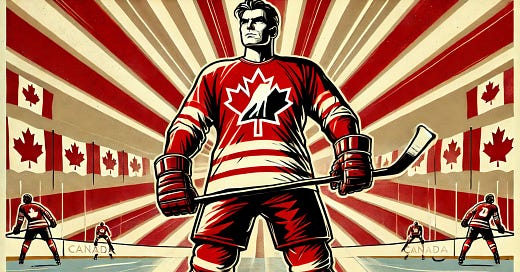This week I faced two passionate Canadians, Laura Babcock and Adam Schaan, to explore a seismic shift underway in the Great White North. What began as a discussion about a heated trade dispute quickly became a broader exploration of a reawakening, a powerful resurgence of Canadian nationalism that has taken hold in the face of external threats, particularly those coming from one man: Donald J. Trump.
Since returning to the White House, President Trump has levelled a volley of provocative attacks at Canada, slapping on aggressive tariffs and, with his characteristic bravado, suggesting that Canada should simply become the 51st state. Instead of acquiescing, Canadians have responded with something far more potent than diplomacy or policy: pride. And not just any pride, but a rediscovered, elbows-up, hockey-checked version of nationalism that transcends provinces and party lines.
At the heart of this moment is Mark Carney, former Bank of England governor, global financial heavyweight, and now, Canada’s Prime Minister. Though he has yet to win a seat in Parliament, Carney’s elevation reflects both a Liberal Party resurgence and a national desire for stability, strategy, and, crucially, sovereignty.
The Trump Effect, From Trade War to Cultural Clash
Trump’s America has always loomed large in Canada’s political and media consciousness. But this time, the threat is existential. Trump’s rhetoric isn’t just about lumber, dairy, or tariffs, it’s about erasure. He’s questioned Canada’s legitimacy as a nation, dismissed its borders as arbitrary lines, and openly suggested annexation.
For Laura Babcock, this is personal. “This is not a trade war,” she told me. “This is a propaganda war and an affront to our sovereignty.” Her language, fiery, passionate, and distinctly Canadian, reveals the emotional undercurrent behind the country’s reaction. The term “elbows up,” a nod to hockey’s defensive stance, is the new national posture.
As Babcock put it, “If you're coming at us, we’ll defend ourselves, and then we’ll take the next shot.”
Pierre Poilievre, Canada’s Mini-Trump?
Caught flat-footed by the Trump-shaped shadow now looming over Canada, Conservative leader Pierre Poilievre finds himself increasingly cornered. Poilievre, dubbed a “mini-Trump” by critics, has long hoped to capitalize on dissatisfaction with Justin Trudeau’s government. But with Trudeau out and Carney in, the Liberals are pivoting, and fast.
Adam Schaan pointed out that Poilievre’s narrative, largely centered on repealing the carbon tax, has been undermined by Carney’s pledge to axe it. More crucially, Trump’s antagonism has reframed the election as a referendum on sovereignty, not policy. For many Canadians, Poilievre is now viewed not as a reformer, but as a risk, a potential collaborator with Trump’s MAGA regime.
This perception could be politically fatal.
The Bloc, Quebec, and the Great Canadian Unifier
In an unexpected twist, even the Bloc Québécois finds itself swept into the current of Canadian unity. Long advocating for Quebec’s autonomy, the Bloc has tempered its message in light of Trump's provocations. Why? Because in the face of foreign belittlement, even Quebecers, fiercely protective of their distinct identity, are finding solidarity with the rest of Canada.
Babcock noted that Poilievre is “reviled” in Quebec, and Carney’s charm offensive, including a well-received appearance at Montreal’s St. Patrick’s Day parade, is paying dividends.
“When someone denigrates your country, you look past your regional differences,” she said. “I’ve never seen a uniting of Canada like this in my life.”
Economic Muscle and Cultural Resistance
Canadian nationalism isn't just rhetorical, it’s showing up on store shelves, in government policy, and even in power grids. Provincial and federal governments have responded to Trump’s tariffs with targeted countermeasures, such as banning U.S. bourbon in British Columbia or threatening to cut power to U.S. states that rely on Canadian electricity.
Boycotts of American products are gaining traction. U.S. flags, once a common sight, are disappearing from Canadian storefronts. This is not knee-jerk anti-Americanism, it’s an intentional assertion of independence and identity.
“There’s a visceral feeling in Canada of an existential threat to our sovereignty,” Schaan observed.
Carney, Saviour or Status Quo?
Not everyone is comfortable rallying behind a former Goldman Sachs banker. Schaan, voicing skepticism, warned of the dangers of “fighting tyranny with tyranny,” citing Carney’s support for expanded emergency powers and the growing authoritarian drift in some Canadian provinces.
But Babcock pushed back, arguing that Carney is exactly what Canada needs in this moment, not a messiah, but a manager.
“Our economy is under attack. I want the best economist,” she said. “Carney isn’t perfect. But he's not Pierre. And we can’t afford Pierre.”
A Battle for Canada’s Soul
The next election will be deeply emotional, possibly bitter, and almost certainly framed around one central question: What does it mean to be Canadian in a world where your most powerful ally starts talking like an adversary?
Geographically, the election will likely be decided in Quebec and Ontario. If the Liberals can consolidate anti-Poilievre sentiment in those populous regions, a minority government, possibly even a majority, is within reach.
But this goes beyond seats and polling numbers. This is about something deeper, older, and harder to quantify, national pride. For many, Trump’s aggression has pulled something latent but potent from the Canadian psyche. A willingness to defend, to assert, to unite.
To say, We are not the 51st anything. We are Canada.
Final Thoughts, Elbows Up, Canada
This isn’t the first time Canadians have had to define themselves against America, but it may be the most consequential. Trump has forced a reckoning, about sovereignty, identity, and unity. In doing so, he may have inadvertently done what no Canadian politician has managed in decades, remind Canadians of what they share.
Elbows up. The fight for Canada’s soul is on.














Share this post